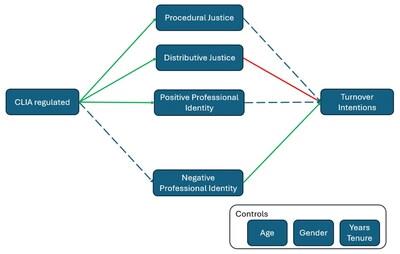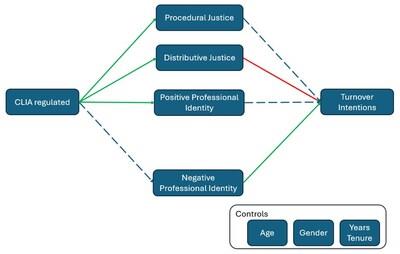
35-Year-Old CLIA Regulations Continue To Shape The Identity And Retention Of Laboratory Professionals

Fig 1 Research model
In an extensive analysis of survey data collected from laboratory professionals across the country, researchers found that those whose specialties are included in the CLIA regulatory requirements report a significantly stronger sense of professional identity and group belonging. These individuals perceive higher levels of procedural and distributive justice compared to their counterparts who were not recognized under CLIA. Conversely, the latter group experiences higher turnover intentions, primarily linked to feelings of negative professional identity and perceived injustices.
Key findings from the survey include:
Ingroup vs. Outgroup Dynamics : Laboratory professionals recognized by CLIA reported a robust sense of belonging and positive identity associated with their roles. In contrast, those not covered by the regulations reported feelings of exclusion, detracting from their professional identity. Perceptions of Justice : The study revealed that perceptions of procedural and distributive justice are significantly higher among professionals included in CLIA, fostering a more favorable work environment. This sense of fairness is linked to decreased turnover intentions. Turnover Intentions : While distributive justice plays a role in turnover intentions, the most significant correlation was found with negative professional identity. Those who feel undervalued or disenfranchised are more likely to seek employment elsewhere.These findings can be interpreted through the lens of Social Identity Theory (SIT), which posits that individuals derive part of their self-identity from the social groups to which they perceive they belong. When laboratory professionals identify with the ingroup-those regulated by CLIA-they are likely to view themselves more positively and differentiate themselves from the perceived outgroup. This differentiation can lead to exacerbating perceived differences and fostering a sense of superiority, even when no rational justification exists.
However, for those professionals excluded from CLIA, feelings of being part of an outgroup can have detrimental effects. They may experience a diminished sense of belonging and an increased perception of injustice, which negatively impacts their job satisfaction and performance. This reinforces a cycle of dissatisfaction, making them more likely to consider leaving their positions.
Concluding the analysis, the study underscores the lasting impacts government policy has in signaling how important one group might be, via their inclusion into the regulation versus unregulated status of some anatomic pathology professionals. Even after 35 years, being part of the select group recognized by legislation has fostered a stronger positive professional identity and greater perceived justice among these individuals. Notably, increased distributive justice correlates with reduced turnover intentions, highlighting the importance of fairness in the workplace.
The most significant predictor of turnover intentions remains negative professional identity. Understanding this through SIT suggests actionable strategies for organizations to mitigate feelings of disenfranchisement among unregulated professionals. By fostering a culture of inclusion and recognizing the contributions of all laboratory professionals, organizations can cultivate a more cohesive workforce that is less prone to turnover.
"Our findings reveal that the legacy of CLIA regulations goes beyond compliance; it fundamentally shapes the professional identities and experiences of laboratory professionals. By addressing the disparities created by these regulations, we can foster a more inclusive and equitable environment for all." -
Dr. Jaime Nieto Sierra, Co-Author of the Study.
The authors emphasize the human impact of Social Identity Theory (SIT) and Justice on workplace dynamics, noting that professions such as nurses and cosmetologist's standard of practice are recognized, while those conducting crucial cancer diagnostic tests are excluded from CLIA. This highlights the need for supportive environments that translate theory into meaningful change for all workers.
This research serves as a clarion call for policymakers and laboratory management to reconsider the implications of existing regulations and the importance of inclusive practices. As the laboratory profession continues to evolve, understanding the historical context and its impact on current professionals is essential for fostering a supportive and productive work environment.
The full study is available for review at
Media Contact:
Dr. Jaime A. Nieto Sierra
973-418-6447
[email protected]
SOURCE Jaime Nieto Sierra
WANT YOUR COMPANY'S NEWS FEATURED ON PRNEWSWIRE? 440k+Newsrooms &
Influencers 9k+
Digital Media
Outlets 270k+
Journalists
Opted In GET STARTED

Legal Disclaimer:
MENAFN provides the
information “as is” without warranty of any kind. We do not accept
any responsibility or liability for the accuracy, content, images,
videos, licenses, completeness, legality, or reliability of the information
contained in this article. If you have any complaints or copyright
issues related to this article, kindly contact the provider above.


















Comments
No comment